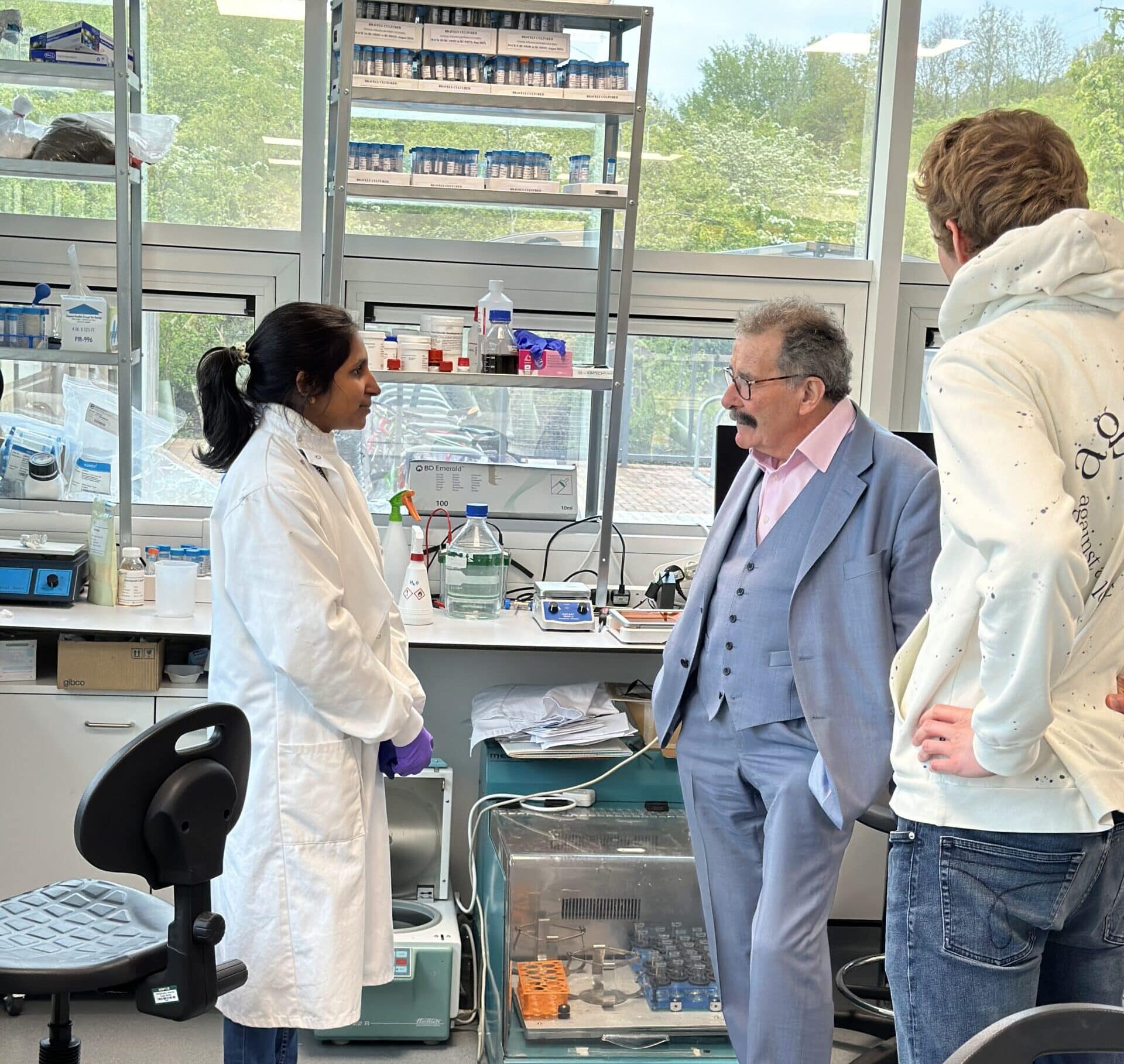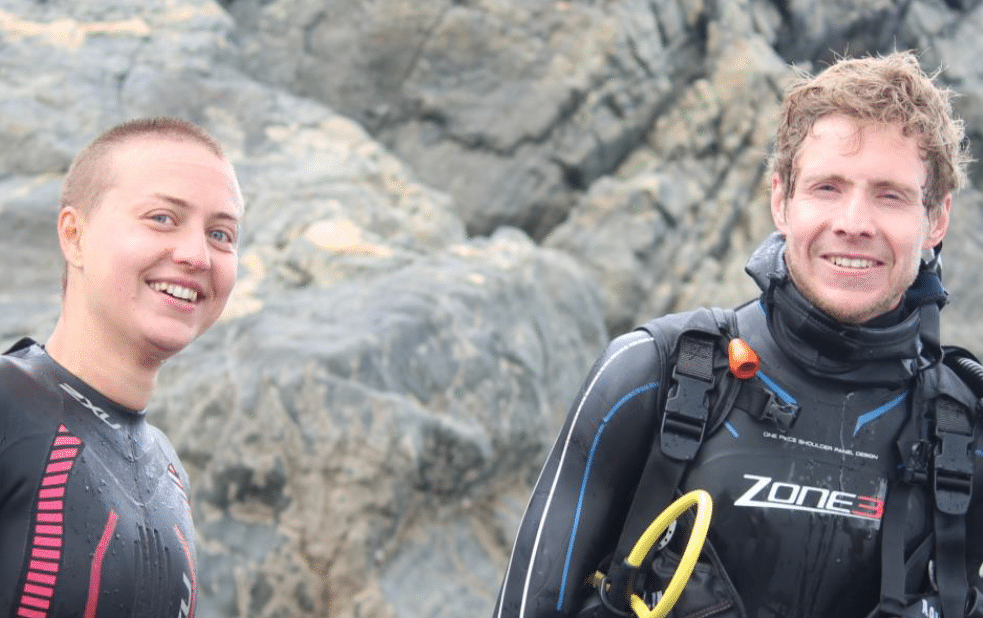We spoke to the co-founder of BravleyCultured – James Dunce – about how the company was started, what it is currently working on, and how its experience at The EpiCentre has helped in shaping the business as it transitions to a new commercial phase.
How Was the Company Started?
BravelyCultured was formed through the Carbon13 Accelerator programme in Cambridge where co-founders James Dunce and Natalija Stepurko set themselves the goal of discovering novel marine micro-organisms and to leverage their unique characteristics to create forward-thinking and sustainable manufacturing technologies.
To achieve this, BravelyCultured goes on bioprospecting trips around the UK during which they scuba dive to collect samples of seaweed and natural sediments from the sea bed. Back at the at The EpiCentre, they use a range of laboratory techniques they have developed in order to isolate a wide variety of micro-organisms such as bacteria, yeast, and fungus, including many that are new to science. They incorporate these micro-organisms into their biobank, “The BravelyCultured Collection”, and collaborate with various industries to accelerate the development of biological solutions.
BravelyCultured has developed a particular specialisation in isolating new species of marine fungus. Of between 2 to 11 million species of fungi predicted to be present on Earth, fewer than 1% have been identified, and there is even less knowledge about the species that exist within our oceans. The BravelyCultured team aims to collect and curate the largest collection of marine fungi and is expanding its efforts to include bacteria and yeast. They seek to make this collection available to various industries including speciality chemicals, cosmetics, agriculture, pharmaceuticals, and other bio-manufacturing industries.
How has the company evolved?
Since our incorporation, we have searched for the most impactful way BravelyCultured can leverage our marine micro-organisms both on a commercial and societal level. Our original business model centred around identifying novel marine micro-organisms that were capable of producing proteins and could be genetically engineered to produce dairy proteins that would have a fraction of the environmental impact of traditional dairy products.
However, various factors, such as the early-stage of our technology development, regulatory hurdles, and the expected requirement for expensive manufacturing facilities in the future, dictated that we were not in a position to take on venture capital.
Through the Founders At The University of Cambridge programme, our team explored the proof points we need to hit and the approaches we could take to our business to maximise our growth potential. Through this, we devised a non-conventional business model which, although involves a traditional route to market on the surface, fosters scalability, upside potential, and social impact at heart.
We are now focused on protecting the IP surrounding our first commercially viable microbially-derived product, and streamlining our workflows for the curation and characterisation of micro-organisms, and forming the key partnerships we require to grow. This includes creating relationships with customers for our first product, industrial stakeholders that see the potential for marine micro-organisms to boost their innovation, and with marine conservation groups that serve as responsible gatekeepers that protect the marine areas that we bio-prospect. Critically, it is with these groups that we seek to share revenue such that our commercial operations contribute to the protection of these important marine ecosystems.
We are optimistic for the future of BravelyCultured. Our first product has large and diverse markets, we have a number of products within the development pipeline, and we have found that there are many companies that want collections of micro-organisms to create a range of different products. Pharmaceuticals have classically engaged with bioprospecting approaches to identify new therapeutic compounds, and we’d been keen to contribute on this front, but there is now a surge of interest in identifying new chemicals from marine micro-organisms for a broad range of industries such as agriculture, pigments, nutraceuticals, and ingredients for the cosmetics and personal care industries.
We’re innovating on three fronts. 1) The scientific approaches we adopt to maximise the range of biodiversity we can isolate within the laboratory. 2) The mechanisms that we leverage to efficiently optimise fermentation workflows to maximise product yields. 3) The way we do business. We want to operate in a flexible manner that can suit both small start-ups and larger institutions, facilitating collaboration and mutual growth and to do this in a socially responsible way that contributes to the protection and maintenance of marine ecosystems and supporting the communities that depend upon them.

Above – Priyanka and James of BravleyCultured meeting Lord Winston.
April 2024 renowned scientist and genetics expert Lord Robert Winston, visited the laboratory facilities at The EpiCentre – read more
Why did you come to The EpiCentre?
We arrived at The EpiCentre in the summer of 2023 just as the company became operational. The demand for space in Cambridge over the last few years has been so incredibly high and expensive that we needed to look further afield.
The cost of renting space was important, but the main reason The EpiCentre was so attractive was because of the flexibility of the licence agreements available, together with the well-equipped shared laboratories spaces that are provided. This includes expensive pieces of laboratory equipment that wouldn’t be cost effective for us to buy ourselves. Having a space where we can have the support of the shared labs facility is invaluable.
What’s worked for you while you have been at The EpiCentre?
What the EpiCentre has been very good at is supporting us through the various changes that we have made to the business; through business expertise from Innovation Director, Gary Jennings, and general brainstorming from Andrew Bell about different ways we could be support our business growth.
The EpiCentre staff have been willing and involved in working through various options and always making sure that the facilities are accessible to us. They have been flexible in numerous circumstances when we have been facing difficulties and have been very start-up friendly.
Gary Jennings has been helpful in connecting us to the right people so that the Norfolk & Suffolk Growth Hub provided business grant support and helped us to secure an Innovate UK grant.
We have been connected to Investor Angel events at The EpiCentre securing some pitching opportunities and we have been provided with opportunities to speak at The EpiCentre events telling people about what we are doing. This exposure is very helpful in seeking dialogue with future investors, clients, and securing partnerships. This all helps in building our network.
Sum it all up –
It seems the team at BravelyCultured have been extremely pleased with their membership at The EpiCentre. The facility leverages its open plan laboratory spaces, equipment, willing and engaged team, and flexible licensing agreements to facilitate business growth. To an extent, it feels like The EpiCentre has a stake in each individual business and is therefore motivated to support their sustainable growth and success. It is the ideal environment for a startup company to set up with an ideal combination of business support expertise and the facilities required by early-stage biotechnology companies.
BravleyCultured at The EpiCentre
2 benches in the shared laboratory space
Desk in write up space
Frequent brainstorming sessions in The Hub cafe
Access to business networking and OBN networking
Part of a larger community
Laboratory and business support
Find out how your enterprise can benefit the same way BravleyCultured has – contact us today
To find out more about Office Space | The EpiCentre | Haverhill, Cambridge (epicentrehaverhill.co.uk)
To find out more about Lab Space | The EpiCentre | Haverhill, Cambridge (epicentrehaverhill.co.uk)
To find out more about Our Members | The EpiCentre | Haverhill, Cambridge (epicentrehaverhill.co.uk)
To find out more about Business Support | EpiCentre | Cambridge, Haverhill (epicentrehaverhill.co.uk)



